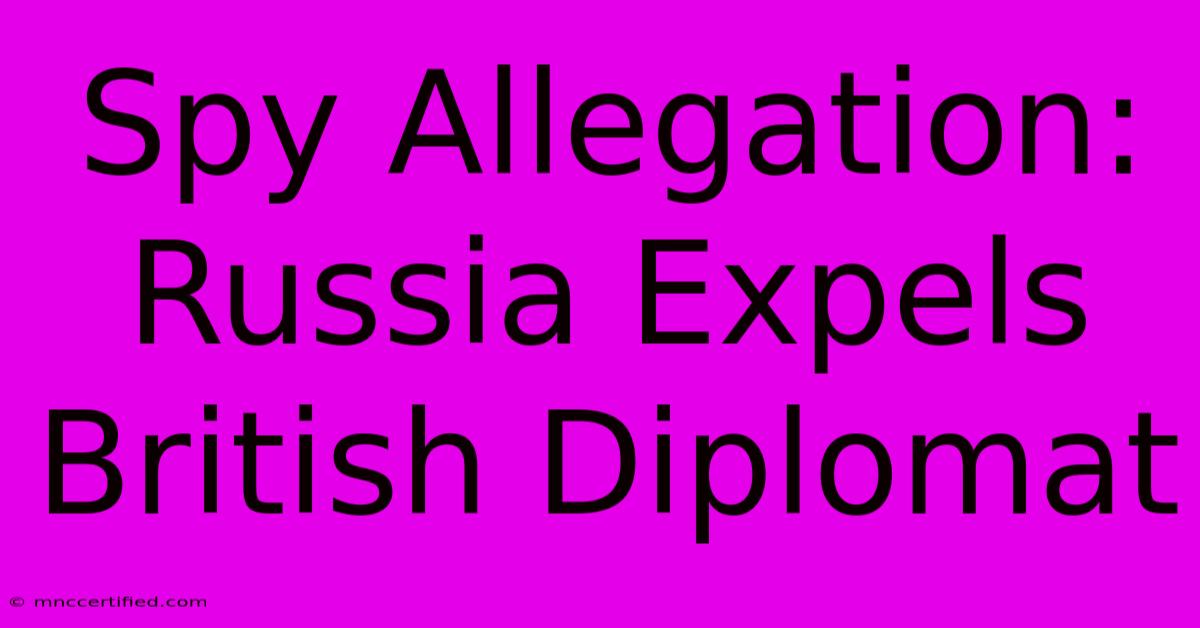Spy Allegation: Russia Expels British Diplomat

Table of Contents
Spy Allegation: Russia Expels British Diplomat – A Deep Dive into the International Incident
The recent expulsion of a British diplomat from Russia, following accusations of espionage, has ignited a fresh wave of tension in already strained UK-Russia relations. This incident, far from being an isolated event, reflects a deeper geopolitical struggle and raises critical questions about international diplomacy and intelligence gathering. This article will delve into the details of the expulsion, explore the potential implications, and analyze the broader context of the escalating conflict.
The Allegation and Expulsion: A Timeline of Events
While precise details surrounding the alleged espionage remain shrouded in secrecy, the Russian Foreign Ministry announced the expulsion of a British diplomat, citing concerns about "unacceptable activities" that threatened national security. The announcement followed a period of heightened tensions between the two countries, fueled by ongoing conflicts in Ukraine and disagreements over various geopolitical issues. The timing of the expulsion, coupled with the lack of transparency regarding the specific charges, has led to speculation and accusations of political maneuvering.
Key Questions Remain Unanswered:
- What specific activities constitute the alleged espionage? The Russian government has offered little concrete evidence, leaving many unanswered questions.
- What is the identity of the expelled diplomat? To protect the diplomat's safety and prevent further escalation, the UK government has largely refrained from public identification.
- What retaliatory measures will the UK take? The expulsion sets a precedent that could lead to a tit-for-tat response from the British government.
The Broader Geopolitical Context: A History of Espionage and Retaliation
The current incident is far from unprecedented. The history of UK-Russia relations is punctuated by similar events, reflecting a long-standing mistrust and rivalry. Both countries have engaged in intelligence operations against each other for decades, often resulting in reciprocal expulsions of diplomats suspected of espionage.
Past Incidents and Their Implications:
- Cold War Espionage: The Cold War saw numerous instances of espionage and counter-espionage, often resulting in high-profile arrests and expulsions.
- Post-Cold War Tensions: Even after the collapse of the Soviet Union, tensions persisted, with accusations of espionage continuing to surface.
- The Salisbury Poisoning: The 2018 poisoning of Sergei Skripal and his daughter, Yulia, in Salisbury, significantly damaged UK-Russia relations and resulted in a large-scale expulsion of Russian diplomats from the UK.
Analyzing the Implications: A Damaged Relationship and Uncertain Future
This recent expulsion represents a significant setback for UK-Russia relations. The lack of transparency and the potential for further retaliatory actions could lead to a sustained period of hostility and decreased diplomatic engagement.
Potential Consequences:
- Further Diplomatic Escalation: The incident risks triggering a cycle of expulsions, further straining communication and cooperation between the two nations.
- Impact on International Relations: The incident underscores the fragility of international relations and the potential for seemingly minor incidents to escalate into major diplomatic crises.
- Challenges for International Cooperation: The ongoing mistrust could hamper collaboration on global issues such as climate change, pandemics, and nuclear non-proliferation.
Conclusion: Navigating the Complexities of International Espionage
The expulsion of the British diplomat highlights the ongoing complexities of international relations and the constant struggle between national security and diplomatic engagement. While the specific details of the alleged espionage remain unclear, the incident serves as a stark reminder of the deep-seated tensions and mistrust that continue to characterize UK-Russia relations. Moving forward, open communication and a commitment to de-escalation are crucial to prevent further deterioration of this already fragile relationship. The international community must work towards fostering a climate of trust and cooperation, even in the face of these significant challenges. Only then can we hope to address the pressing global issues that require collaborative efforts.

Thank you for visiting our website wich cover about Spy Allegation: Russia Expels British Diplomat. We hope the information provided has been useful to you. Feel free to contact us if you have any questions or need further assistance. See you next time and dont miss to bookmark.
Featured Posts
-
Abrar Salman Ayub Series Tied
Nov 27, 2024
-
8 Missing After Egypt Red Sea Boat Accident
Nov 27, 2024
-
Does Nexgenesis Take Insurance
Nov 27, 2024
-
Cheap Car Insurance Modesto Ca
Nov 27, 2024
-
Bayern Vs Psg Ucl 2024 25 Live Score
Nov 27, 2024